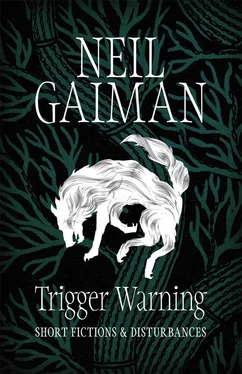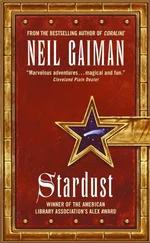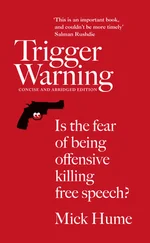Neil Gaiman - Trigger Warning - Short Fictions and Disturbances
Здесь есть возможность читать онлайн «Neil Gaiman - Trigger Warning - Short Fictions and Disturbances» весь текст электронной книги совершенно бесплатно (целиком полную версию без сокращений). В некоторых случаях можно слушать аудио, скачать через торрент в формате fb2 и присутствует краткое содержание. Год выпуска: 2015, Издательство: Headline, Жанр: Старинная литература, на английском языке. Описание произведения, (предисловие) а так же отзывы посетителей доступны на портале библиотеки ЛибКат.
- Название:Trigger Warning: Short Fictions and Disturbances
- Автор:
- Издательство:Headline
- Жанр:
- Год:2015
- ISBN:нет данных
- Рейтинг книги:4 / 5. Голосов: 1
-
Избранное:Добавить в избранное
- Отзывы:
-
Ваша оценка:
- 80
- 1
- 2
- 3
- 4
- 5
Trigger Warning: Short Fictions and Disturbances: краткое содержание, описание и аннотация
Предлагаем к чтению аннотацию, описание, краткое содержание или предисловие (зависит от того, что написал сам автор книги «Trigger Warning: Short Fictions and Disturbances»). Если вы не нашли необходимую информацию о книге — напишите в комментариях, мы постараемся отыскать её.
Trigger Warning: Short Fictions and Disturbances — читать онлайн бесплатно полную книгу (весь текст) целиком
Ниже представлен текст книги, разбитый по страницам. Система сохранения места последней прочитанной страницы, позволяет с удобством читать онлайн бесплатно книгу «Trigger Warning: Short Fictions and Disturbances», без необходимости каждый раз заново искать на чём Вы остановились. Поставьте закладку, и сможете в любой момент перейти на страницу, на которой закончили чтение.
Интервал:
Закладка:
The Man Who Forgot Ray Bradbury
I forgot my friend. Or rather, I remembered everything about him except his name. He had died over a decade before. I remembered our phone conversations, our time together, the way he talked and gestured, the books he had written. I resolved that I would not go to the Internet and look. I would simply remember his name. I would walk around trying to remember his name, and began to be haunted by the idea that if I could not remember his name he would never have existed. Foolishness, I knew, but still . . .
I wrote ‘The Man Who Forgot Ray Bradbury’ as a ninetieth-birthday present for Ray Bradbury, and as a way of talking about the impact that Ray Bradbury had on me as a boy, and as an adult, and, as far as I could, about what he had done to the world. I wrote it as a love letter and as a thank-you and as a birthday present for an author who made me dream, taught me about words and what they could accomplish, and who never let me down as a reader or as a person as I grew up.
My editor at William Morrow, Jennifer Brehl went to his bedside and read the story to him. The thank-you message he sent me by video meant the world to me.
My friend Mark Evanier told me that he met Ray Bradbury when he was a boy of eleven or twelve. When Bradbury found out that Mark wanted to be a writer, he invited him to his office and spent half a day telling him the important stuff: if you want to be a writer, you have to write. Every day. Whether you feel like it or not. That you can’t just write one book and stop. That it’s work, but the best kind of work. Mark grew up to be a writer, the kind who writes and supports himself through writing.
Ray Bradbury was the kind of person who would give half a day to a kid who wanted to be a writer when he grew up.
I encountered Ray Bradbury’s stories as a boy. The first one I read was ‘Homecoming’, about a human child in a world of Addams Family -style monsters, who wanted to fit in. It was the first time anyone had ever written a story that spoke to me personally. There was a copy of The Silver Locusts (the UK title of The Martian Chronicles ) knocking about my house. I read it, loved it, and bought all the Bradbury books I could from the travelling bookshop that set up once a term in my school. I learned about Poe from Bradbury. There was poetry in the short stories, and it didn’t matter that I was missing so much: what I took from the stories was enough.
Some authors I read and loved as a boy disappointed me as I aged. Bradbury never did. His horror stories remained as chilling, his dark fantasies as darkly fantastic, his science fiction (he never cared about the science, only about the people, which was why the stories worked so well) as much of an exploration of the sense of wonder as they had been when I was a child.
He was a good writer, and he wrote well in many disciplines. He was one of the first science fiction writers to escape the ‘pulp’ magazines and to be published in the ‘slicks’. He wrote scripts for Hollywood films. Good films were made from his novels and stories. Long before I was a writer Bradbury was one of the writers that other writers aspired to become.
A Ray Bradbury story meant something on its own – it told you nothing of what the story would be about, but it told you about atmosphere, about language, about some sort of magic escaping into the world. Death Is a Lonely Business, his detective novel, is as much a Bradbury story as Something Wicked This Way Comes or Fahrenheit 451 or any of the horror, or science fiction, or magical realism, or realism you’ll find in the short-story collections. He was a genre on his own, and on his own terms. A young man from Waukegan, Illinois, who went to Los Angeles, educated himself in libraries, and wrote until he got good, then transcended genre and became a genre of one, often emulated, absolutely inimitable.
I met him first when I was a young writer and he was in the UK for his seventieth-birthday celebrations, held at the Natural History Museum. We became friends in an odd, upside-down way, sitting beside each other at book signings, at events. I would be there when Ray spoke in public over the years. Sometimes I’d introduce him to the audience. I was the master of ceremonies when Ray was given his Grand Master Award by the Science Fiction and Fantasy Writers of America: he told them about a child he had watched, teased by his friends for wanting to enter a toy shop because they said it was too young for him, and how much Ray had wanted to persuade the child to ignore his friends and play with the toys.
He’d speak about the practicalities of a writer’s life (‘You have to write!’ he would tell people. ‘You have to write every day! I still write every day!’) and about being a child inside (he said he had a photographic memory, going back to babyhood, and perhaps he did), about joy, about love.
He was kind, and gentle, with that midwestern niceness that’s a positive thing rather than an absence of character. He was enthusiastic, and it seemed that that enthusiasm would keep him going forever. He genuinely liked people. He left the world a better place, and left better places in it: the red sands and canals of Mars, the midwestern Hallowe’ens and small towns and dark carnivals. And he kept writing.
‘Looking back over a lifetime, you see that love was the answer to everything,’ Ray said once, in an interview.
He gave people so many reasons to love him. We did. And, so far, we have not forgotten.
Jerusalem
This story was commissioned by the BBC for its William Blake Week. They asked if I could write a story to be read on Radio Four, inspired by a Blake poem.
I had recently visited Jerusalem, and wondered what it would actually take to build Jerusalem in England’s green and pleasant land. And what kind of person would want to.
I make many things up, but Jerusalem syndrome is a real thing.
Click-Clack the Rattlebag
I wrote this in the house of my friends Peter Nicholls and Clare Coney, in Surrey Hills, Melbourne, Australia. It was Christmas. Oddly enough, despite the sweltering temperatures, it was a white Christmas: thick, marble-sized hail fell during our Christmas dinner and blanketed the Coney–Nicholls lawn. I wrote it for a book of new monsters, edited by Kasey Lansdale, but it was first published as an audiobook by Audible in the U.S. and the UK. They gave it away for free, for Hallowe’en, and gave money to good causes for each person who downloaded it. So everyone was happy, except the people who had downloaded the story, and listened to it late at night, and then had to go around turning all the lights on.
The house in the story is based on my friend Tori’s house in Kinsale, Ireland, which is obviously not actually haunted, and the sound of people upstairs moving wardrobes around when you are downstairs there and alone is probably just something that old houses do when they think they are unobserved.
An Invocation of Incuriosity
Children are driven by a sense of injustice, and it sticks around as we age, bury it however we try. It still rankles that, almost forty years ago, when I was fifteen, I wrote a short story for my mock English O level that was graded down from an A to a C with an explanatory comment from the teacher that it ‘was too original. Must obviously have copied it from somewhere.’ Many years later, I took my favourite idea from that tale and put it into this. I’m pretty sure that the idea was original, but it gave me pleasure to put it into a story dedicated to Jack Vance and set in the world of The Dying Earth .
Writers live in houses other people built.
Читать дальшеИнтервал:
Закладка:
Похожие книги на «Trigger Warning: Short Fictions and Disturbances»
Представляем Вашему вниманию похожие книги на «Trigger Warning: Short Fictions and Disturbances» списком для выбора. Мы отобрали схожую по названию и смыслу литературу в надежде предоставить читателям больше вариантов отыскать новые, интересные, ещё непрочитанные произведения.
Обсуждение, отзывы о книге «Trigger Warning: Short Fictions and Disturbances» и просто собственные мнения читателей. Оставьте ваши комментарии, напишите, что Вы думаете о произведении, его смысле или главных героях. Укажите что конкретно понравилось, а что нет, и почему Вы так считаете.







